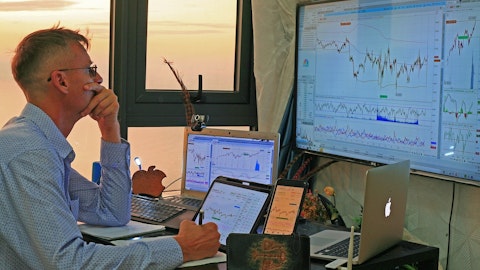Bernadette Madarieta: Yeah, I think that’s right, Tom. And the only piece that’s different in the European market is that generally we’ll contract for about 75%, whereas there is the open market for the remaining 25%, and we’ve seen, of late, that the open market prices have started to come down.
Rob Dickerson: Right. But I’m thinking all the way forward to, let’s say, the end of back half of next fiscal year, right, I’m assuming as we go into these contract negotiations go kind of toward the end of this calendar year, right, harvesting could this year probably put you in a pretty good position in those discussions.
Tom Werner: We are not going to comment on negotiating discussions publicly. We don’t do that. And it will be — we’ll let it play out the way it plays out. We will be disciplined in the process we follow every year. And at the appropriate time, when we come to some agreement, as we always do, and the market knows, you will see what our raw price is going to be for the next year.
Rob Dickerson: All right. Great. Thank you. See you next week.
Tom Werner: Yes.
Bernadette Madarieta: Thank you.
Operator: [Operator Instructions] We’ll now take a question from William Reuter with Bank of America.
William Reuter: Hi.
Bernadette Madarieta: Hi.
William Reuter: Just quickly to make sure on the last question, you contract for 75% in Europe, but that’s 100% in North America. Is that right?
Bernadette Madarieta: That’s correct.
William Reuter: Okay. And then, you have 20% of your contracts that are up for renewal. How does that compare to where you would have been last year or in a typical year?
Bernadette Madarieta: Yes, typically, we have about 25% up for renewal. So, slightly down, but around average.
William Reuter: Okay. And then just lastly for me. The elevated CapEx of $800 million to $900 million, how should we think about that CapEx number over the next handful of years?
Bernadette Madarieta: Yes. So, CapEx fluctuates year to year. As we have discussed in the past, we had a pent-up demand after COVID where we had a couple of years of higher spending. I’m going to speak more to that during Investor Day, in terms of how to think about that over the next few years. So I will go ahead and leave it for Investor Day.
William Reuter: I assume that might have been the answer. Okay. That’s all from me. Thank you.
Operator: And that does conclude our question-and-answer session. I would like to hand the conference back over to Mr. Congbalay for any additional or closing comments.
Dexter Congbalay: Thanks for joining the call today. If you do plan on or want to come to our Investor Day, please shoot me an email and I can send you the invite if you haven’t gotten it already. If you do — if you have gotten it and you do want to attend since it’s at the New York Stock Exchange, you do have to register in advance so you can put you on the list to get in. Any questions on the call today or kind of going forward, shoot me a note, we can set up some time. But, again thanks for joining the call and we’ll talk to you next week.
Operator: And once again, that does conclude today’s conference. We thank you all for your participation. You may now disconnect.
Follow Lamb Weston Holdings Inc. (NYSE:LW)
Follow Lamb Weston Holdings Inc. (NYSE:LW)
Receive real-time insider trading and news alerts





